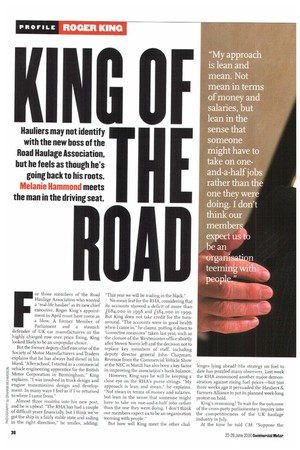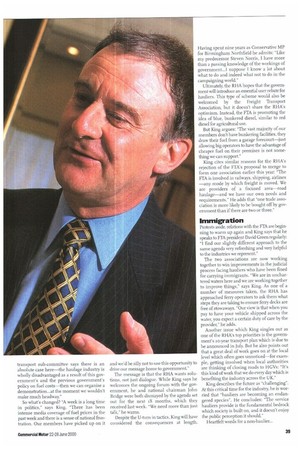KING OF
Page 40

Page 41

If you've noticed an error in this article please click here to report it so we can fix it.
Hauliers may not identify with the new boss of the Road Haulage Association, but he feels as though he's going back to his roots. Melanie Hammond meets the man in the driving seat.
For those members of the Road Haulage Association who wanted a "real-life haulier" as its new chief executive, Roger King's appointment in April must have come as a blow. A former Member of Parliament and a staunch defender of UK car manufacturers in the highly charged row over price fixing, King looked likely to be an unpopular choice.
But the former deputy chief executive of the Society of Motor Manufacturers and Traders explains that he has always had diesel in his blood. "After school, I started as a commercial vehide engineering apprentice for the British Motor Corporation in Birmingham," King explains. "I was involved in truck design and engine transmission design and development. In many ways I feel as if I've returned to where I came from."
Almost three months into his new post, and he is upbeat. "The RHA has had a couple of difficult years financially, but I think we've got the ship in a fairly stable state and sailing in the right direction," he smiles, adding: "This year we will be trading in the black."
No mean feat for the RHA, considering that its accounts showed a deficit of more than £684,00u0 in 1998 and £584,000 in 1999. But King does not take credit for the turnaround. "The accounts were in good health when I came in," he claims, putting it down to "corrective measures" taken last year, such as the closure of the Westminster office shortly after Steven Norris left and the decision not to replace key members of staff, including deputy director general John Chapman. Revenue from the Commercial Vehicle Show at the NEC in March has also been a key factor in improving the association's bank balance.
However, King says he will be keeping a close eye on the RHA's purse strings. "My approach is lean and mean," he explains. "Not mean in terms of money and salaries, but lean in the sense that someone might have to take on one-and-a-half jobs rather than the one they were doing. I don't think our members expect us to be an organisation teeming with people."
But how will King meet the other chal
lenges lying ahead? His strategy on fuel to date has puzzled many observers. Last week the RHA announced another major demonstration against rising fuel prices—but just three weeks ago it persuaded the Hauliers & Farmers Alliance to put its planned week-long protest on hold.
King's reasoning? To wait for the outcome of the cross-party parliamentary inquiry into the competitiveness of the UK haulage industry in July.
At the time he told CM: "Suppose the transport sub-committee says there is an absolute case here—the haulage industry is wholly disadvantaged as a result of this government's and the previous government's policy on fuel costs—then we can organise a demonstration.. .at the moment we wouldn't make much headway."
So what's changed? "A week is a long time in politics," says King. "There has been intense media coverage of fuel prices in the past week and there is a sense of national frustration. Our members have picked up on it
and we'd be silly not to use this opportunity to drive our message home to government."
The message is that the RHA wants solutions, riot just dialogue. While King says he welcomes the ongoing forum with the government, he and national chairman John Bridge were both dismayed by the agenda set out for the next 18 months, which they received last week. "We need more than just talk," he warns.
Despite the U-turn in tactics, King will have considered the consequences at length.
Having spent nine years as Conservative MP for Birmingham Northfield he admits: "Like my predecessor Steven Norris, I have more than a passing knowledge of the workings of government...I suppose I know a lot about what to do and indeed what not to do in the campaigning world."
Ultimately, the RHA hopes that the government will introduce an essential user rebate for hauliers. This type of scheme would also be welcomed by the Freight Transport Association, but it doesn't share the RHA's optimism. Instead, the FTA is promoting the idea of blue, bunkered diesel, similar to red diesel for agricultural use.
But King argues: "The vast majority of our members don't have bunkering facilities, they draw their fuel from a garage forecourt—just allowing big operators to have the advantage of cheaper fuel on their premises is not something we can support."
King cites similar reasons for the RH A's rejection of the PTA's proposal to merge to form one association earlier this year: "The FTA is involved in railways, shipping, airlines —any mode by which freight is moved. We are providers of a focused area—road haulage—and we have our own needs and requirements." He adds that "one trade association is more likely to be bought off by government than if there are two or three."
Immigration Protests aside, relations with the FTA are beginning to warm up again and King says that he speaks to FTA president David Green regularly: "I find our slightly different approach to the same agenda very refreshing and very helpful to the industries we represent"
The two associations are now working together to win improvements in the judicial process facing hauliers who have been fined for carrying immigrants. "We are in unchartered waters here and we are working together to improve things," says King. As one of a number of measures taken, the RHA has approached ferry operators to ask them what steps they are taking to ensure ferry decks are free of stowaways. "Our view is that when you pay to have your vehicle shipped across the water, you expect a certain duty of care by the provider," he adds.
Another issue which King singles out as one of the RHA's top priorities is the government's 10-year transport plan which is due to be announced in July. But he also points out that a great deal of work goes on at the local level which often goes unnoticed—for example, getting involved when local authorities are thinking of closing roads to HGVs: "It's this kind of work that we do every day which is benefiting the industry across the UK."
King describes the future as "challenging". At this critical time for the industry, he is worried that "hauliers are becoming an endangered species". He concludes: "The service hauliers provide is the fundamental bedrock which society is built on, and it doesn't enjoy the public perception it should."
Heartfelt words for a non-haulier...
















































































































